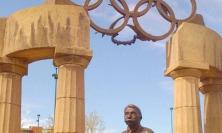Is Rio de Janeiro ready to be the centre of the world’s attention for the duration of the 2016 Olympic and Paralympic Games? A Jesuit scholastic living and studying in Brazil shares his perspective on the country’s preparations to step into the spotlight. The world is expecting a carnival, says Ricardo da Silva SJ – will Rio 2016 deliver?
The most iconic global sporting event is about to begin in the ‘Marvellous City’, as Rio de Janeiro is affectionately known here in Brazil. The Olympic Games provide an arena for those at the peak of their sporting career to display their talent, and the desire of each athlete is palpable as they contend for the coveted Olympic medal. However, just as Olympic greats fall from grace, so too the imminent Games have their less-than-gold side. And the host city, despite its undeniable natural beauty and the warmth of its people, is having its faults uncovered.
The road to the Olympic Games in Rio has been marred with controversies: from the unexpected ousting of teams and individual athletes found guilty of doping, to the declared bankruptcy of the host city (owing in part to the mismanagement of Olympic funds) [i] and the collapse of Rio’s public health service. In addition, the feared proliferation of the Zika virus and severe pollution in the popular water sports venue, Guanabara Bay, have led some competitors and spectators to cancel travel plans. Overall, the Olympic city, and particularly the stadia and spaces that are expected to host Olympians and supporters, seems unprepared for the sporting spectacle. Kenneth Maxwell, a British Historian and founder of the Brazilian Studies programme at Harvard University, in an interview for BBC Brasil said of the present situation: ‘It is currently very difficult to find something positive amid the tsunami of bad news.’[ii]
Living in a neighbouring state, in the city of Belo Horizonte some 350 kilometres away, I could be forgiven for not knowing that the Games are coming to town. As a South African, I remember the fervour with which South Africa lived the lead-up to the FIFA World Cup in 2010. You could not look at a newspaper, turn on the television, listen to the radio, flip through a magazine or even go grocery shopping without being bombarded with related publicity. For some time, the comparative silence in Brazil here has unnerved me. However, I am quickly reminded of the great troubles facing the country in the wake of the PetroBras scandals and the associated political turmoil, which has resulted in the recent vote to impeach President Dilma Rousseff. This has caused serious financial instability in an already recession-hit Brazil in general and in Rio in particular. It is staggering to note that just a few years ago Brazil was one of the most promising players in the developing world’s economy. Today, the picture seems quite different. Given this, the lacklustre fashion with which the average Brazilian appears to anticipate the Games is unsurprising. In fact, it is probably more honest, more in keeping with the national mood, that there has not been disproportionate and feverish attention lavished on the Games, given the extant realities that plague the day-to-day. An article in the widely-read and respected investigative publication, Carta Capital, reports on this pessimism, following the collapse of a much anticipated cycleway built for the Games:
On the streets of Rio de Janeiro, there is a single issue: the political crisis. The tragedy on the Tim Maia Cycleway, that left two dead, came to aggravate the pessimism and ground the feeling amongst the population that there are no consequences [that those responsible for such tragedies are immune from punishment]. The city that, within one hundred days, will host the biggest sporting event on the planet, does not appear to be touched by the Olympic spirit. Nothing of green and yellow and of painted flags on the streets – as was witnessed before the World Cup. [iii]
I was living in London in the run-up to the 2012 Games and working with an organisation caring for homeless people. One of our greatest concerns was the safety of those living on the streets, as we had been warned of the ‘clean-up’ operation that was intended to remove unwanted persons from the streets. We were asked to furnish the City of London with statistics and headcounts, so that measures could be taken to relocate and, in some cases, to remove people forcibly from the streets of central London: homeless people were an embarrassment to the great city. Of course, this was never explicitly declared and was always presented under the guise of concern for the poor. In South Africa, similar operations took place before the World Cup, and their effects were witnessed most acutely on the streets of central Johannesburg.
The statistics suggest that the same approach is being taken in Rio, with devastating effects. We know that Rio authorities have been tasked with a clean-up of the streets, especially given the high frequency of violence for which the city is known, in an effort to allay the fears of prospective visitors. However, recent months have shown alarmingly elevated numbers of missing persons. In a study by the Laboratory for the Analysis of Violence in the State University of Rio (Universidade Estadual do Rio), sociologist Ignácio Cano reports that in 2015 there were 2,533 registered missing persons, compared to a figure of 1,455 for 2005 (while the number of registered homicides has decreased to 995 in 2015 from 2,030 in 2005). More frightening still is that these statistics point largely to missing persons from Rio’s poorest residential areas and famed favelas, from the most marginalised and largely black communities. Douglas Belchior, commenting on this, suggests that it is not beyond the realm of possibility that the supposed threat to Rio’s already fragile image that is posed by people from these communities has been eliminated via undercover methods due to the high cost of the perceived alternative: imprisonment.[iv] Even if Belchior’s conclusions seem too far-fetched, admissions from the former Secretary for National Security, who was questioned about the capture and detention of poor youths on their way to Rio’s public beaches aboard public transport, will not do anything to alleviate concerns about the treatment of Rio’s citizens:
José Vicente da Silva Filho ... recognises that measures such as the removal of adolescents from buses is palliative. However, he affirms that it is necessary at this time to deter potential offenders and reduce the feeling that minor infractions end up unpunished. What is lacking, according to him, is a long term investment in intelligence and data collection such that authorities know, in fact, who is a criminal and who is a good citizen.[v]
In fact, these concerns are so serious that Amnesty International issued a statement condemning the disproportionate violence by police. Atila Roque, Executive Director of Amnesty International Brazil, writes:
There is an increase in unnecessary and excessive use of force by police in the state of Rio de Janeiro in recent years, leading to many deaths. The victims are mostly young, black, slum and periphery dwellers. In the year 2014, when Brazil hosted the World Cup, police killed 580 people in the state of Rio de Janeiro, 40% more than in 2013. The number in 2015 was even greater: 645 dead. It is not possible to directly relate the increase in killings by police with preparations for the Olympics. However, statistics show a clear pattern of unnecessary and excessive use of force, violence and impunity that call into question the institutions responsible for public security.[vi]
In addition to the security concerns that locals are believed to pose, there is the ever greater threat of terrorism, which Rio officials and the National Security Agency are taking very seriously. It appears that Rio will not spare a cent to ensure the safety of all, with a suspected budget that runs into the hundreds of millions of dollars. The specifics of their spending and operations are not public knowledge, but it is rumoured that intelligence personnel have been recruited from 110 countries and a 38,000 strong military team commissioned.
Aside from public security concerns, analysts are also expressing great concern for the ecological impact of the Games and lament the reality of what, on paper, promised to be the most sustainable Games ever. We know that it would be impossible to host such an event without generating a significant amount of pollution; but it was thought that Rio would be able to offset many of its carbon emissions and that it would embark upon a massive clean-up operation to depollute Guanabara Bay, the venue for many of the water sports events. This was a target for the World Cup that went unrealised, so it was thought that the Games would provide a new opportunity to fulfil earlier promises. Aside from planting a few trees to neutralise some of the pollution, the more ambitious ecological projects have failed.
Rio’s State Environmental Secretary has admitted that the target of depolluting 80% of its waters before the Games was ambitious and is not going to be met, due to the financial crisis which the city is presently enduring. It has been estimated that the cost of a full clean-up operation would be $6.2billion. However, the Games aside, this surely has to be a priority for the city. Much of the pollution is due to the lack of public sanitation: an estimated 100,000 inhabitants in the surrounding areas use the bay as their personal sink and sewer because they simply do not have other means of disposing of their rubbish. In a somewhat comical, yet tragic, moment in recent weeks, a swimmer was seen fishing a refrigerator from the bay’s waters, and some competitors have even joked that the real competition will be to dodge the obstacles in the water. There has been concern, too, about the super-viruses that may wash up in Rio’s waters but these fears have been met with strong criticism and the assurance that state agencies are monitoring the waters closely and testing insistently to ensure overall safety.[vii]
As Kenneth Maxwell said, it is difficult to find a positive aspect to report, but in the hostile and mistrusting world in which we live there is one feature of these Games that merits special mention. The welcome of all people has been central to the Olympic legacy and the Rio Games are carrying this forward and promoting the spirit of the five rings, which brings together people from every nation. In response to the global refugee crisis, and for the first time in history, a team of refugees has been invited to compete in the Olympic Games under the Olympic flag. The Games’ publicity machine has been sure to capitalise on this gesture, but this does not diminish its significance and symbolism. The team consists of ten members (see them here), across various sporting disciplines. The UN High Commissioner for Refugees saluted this effort by the International Olympic Committee (IOC), stating that ‘[the refugees’] participation in the Olympics is a tribute to the courage and perseverance of all refugees in overcoming adversity and building a better future for themselves and their families’. The theme of a global welcome has not only been embraced by the IOC, it has also inspired the Opening Ceremony. Brazil will use the inaugural spectacle to showcase its own history of migration and its status as a country that is inclusive, unprejudiced and populated by peoples from all corners of the world. A recent editorial in a popular paper claimed that the ceremony ‘wants to send a clear message in times of the humanitarian crisis: that immigration is positive.’[viii]
All the challenges, reservations and tragedies aside, once the flame lights up the Olympic cauldron on 5 August, the whole country is likely to erupt in celebrations, suspend its everyday concerns and welcome the world. After all, that is the spirit of Carnival for which the Brazilian people are renowned. Rio will put on a show to rival any other and the world will be impressed; however, the consequences will be felt for years to come.
Ricardo da Silva SJ is studying Theology at the Jesuit Faculty of Philosophy and Theology (FAJE) in Belo Horizonte, Brazil. He is a member of the South African Region of the Society of Jesus.
[i] http://www.forbes.com/sites/timworstall/2016/06/18/hosting-olympics-bankrupts-another-place-rio-de-janeiro-declares-financial-disaster/#1e81fc606f93
[ii] http://www.bbc.com/portuguese/noticias/2016/03/160305_lula_kenneth_maxwell_lab
[iii] Nas ruas do Rio de Janeiro, o assunto é um só: a crise política. E a tragédia na Ciclovia Tim Maia, que deixou dois mortos, veio agravar o clima de pessimismo e sedimentar a sensação de impunidade entre a população. A cidade, que dentro de cem dias sedia o maior evento esportivo do planeta, não parece tocada pelo espírito olímpico. Nada de verde e amarelo, de bandeirolas pinturas nas ruas – como se viu antes da Copa do Mundo.(Available online: http://www.cartacapital.com.br/sociedade/rio-2016-vence-cronograma-mas-nao-a-desconfianca [Consulted on 29 July 2016. Translation is author’s own.])
[iv] A crise econômica impede o aprisionamento de tantos mais corpos vivos. Afinal, presos tem alto custo, precisam comer, vestir, dormir e, muito embora superlotar prisões seja ideal para a prática de desvios de verba que acontecem país afora, os tempos são de vacas magras. Exterminar e sumir com os corpos é barato, prático, silencioso e eficaz. Hipótese ou desvario irresponsável? Estariam os argumentos aqui descritos, fora da realidade? Não creio. ‘The economic crisis impedes the imprisonment of so many more live bodies. In fact, prisoners have a high cost, they have to eat, be clothed, sleep; and although overcrowding prisons is ideal to facilitate the deviation of funds that happens across the country, times are lean. Exterminating and disappearing with the bodies is cheap, convenient, quiet and effective. Hypothesis or irresponsible folly? Are the arguments described herein beyond reality? I do not believe they are.’ (Available online: http://negrobelchior.cartacapital.com.br/globo-e-governos-o-que-fazer-com-os-corpos-negros-na-cidade-olimpica/ [Consulted on 29 July 2016. Translation is author’s own.])
[v] Coronel da reserva da Polícia Militar, José Vicente da Silva Filho é ex-secretário nacional de Segurança e reconhece que medidas como o recolhimento de adolescentes nos ônibus são paliativas. Porém, afirma, é necessária neste momento para intimidar potenciais infratores e reduzir a sensação de que pequenos delitos acabam impunes. O que falta, segundo ele, é uma aposta de longo prazo em Inteligência e coleta de informações para que as autoridades saibam, de fato, quem é criminoso e quem é cidadão de bem. (Available online: http://www.cartacapital.com.br/sociedade/na-praia-rio-se-confronta-com-v... [Consulted on 29 July 2016. Translation is author’s own.])
[vi] Há um aumento no uso desnecessário e excessivo da força pela polícia no estado do Rio de Janeiro nos últimos anos, levando a muitas mortes. As vítimas são majoritariamente jovens, negros, moradores de favelas e periferias. No ano de 2014, quando o Brasil sediou a Copa do Mundo, a polícia matou 580 pessoas no estado do Rio de Janeiro, 40% mais do que em 2013. O número em 2015 foi ainda maior: 645 mortos. Não é possível relacionar diretamente o aumento dos homicídios cometidos por policiais com os preparativos para os Jogos Olímpicos. No entanto, as estatísticas revelam um claro padrão de uso desnecessário e excessivo da força, violência e impunidade que colocam em xeque as instituições responsáveis pela segurança pública. (Available online: https://anistia.org.br/noticias/olimpiadas-2016 [Consulted on 29 July 2016. Translation is author’s own.])
[vii] http://www1.folha.uol.com.br/esporte/olimpiada-no-rio/2016/07/1793748-lixo-na-baia-de-guanabara-e-desafio-para-os-jogos-diz-secretario-de-meio-ambiente.shtml
[viii] http://veja.abril.com.br/esporte/tema-da-abertura-da-rio-2016-sera-a-formacao-da-sociedade-brasileira/






